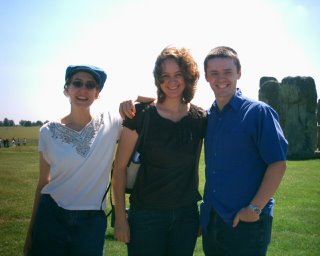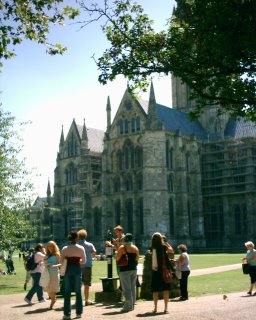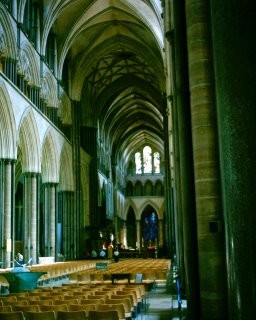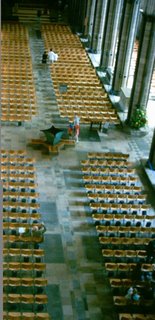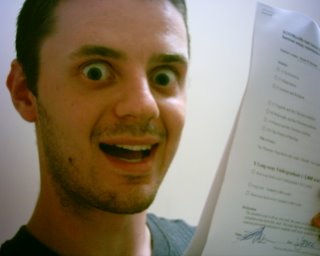Monday, July 31, 2006
I've taken the time to fill in some details/pictures of my first two days in London. More to come...
Wednesday, July 26, 2006
not-so-bad news
[edit July 27] I've recovered some of the pictures! Yay!
Look to the past and ye shall see a vast, shimmering sea of memorial images; dive in and drink deeply of the water of rememberance!
Look to the past and ye shall see a vast, shimmering sea of memorial images; dive in and drink deeply of the water of rememberance!
Canterbury, and then home
After a looong wait at Heathrow, a 12-hour flight, a 12-hour sleep, and an uneventful day at work, I can safely say that I'm home at last.
Waiting for the bus into Canterbury I met a girl named Kathryn, who had just talked to another Canadian who had also just come from Oxford and was headed to the same hostel on the previous Bus. I sat and talked with her on the bus, and we bumped into Andrew (the other Canadian) at the grocery store beside the bus station. Kathryn helped us find the Hostel to drop off our luggage and then she took us around the town to see what's what.
I stayed at a hostel not too far from all the major sites, so the next morning I got a good long look at the Cathedral and St. Augustine's abbey before my bus back to London. The Cathedral is just so... Full of history, I suppose, but there's more to it than that. Highlights for me included the crypt and the chapels with original wall paining. The ornamentation set up around the site of Becket's martyrdom is a bit odd, but the approach is relatively historical. (Come look! See! A famous guy died here! He was stabbed with swords!)
What has caught me off guard most in England's cathedrals are the numerous military memorials in the most prominent places along the walls up and down each side. The English really give their fallen soldiers the places of highest honour. I suppose it's not an entirely different approach than we take here, only more visible. (There's also another thousand years of warfare to remember when you're in England, not just the last two centuries.)
St. Augustine's abbey was interesting, but I wouldn't pay $5 to get in again as it's not much more than some ruins. The free audio guide was a nice touch, though; quite thorough and narrated by Sir Derek Jacobi.
After my bus back into London I took in as much atmosphere as I could in the last day, mostly riding around on the bus to see the place from a different perspective. London is huge, busy, loud, colourful, and expensive.
After a night in Heathrow terminal 3 (reading and writing things down and listening to music, mostly) I checked in with Air Canada as soon as they opened. Customs and security took almost an hour, I think. Waiting in the departure lounge was interesting, because the whole place is designed to make you miss your flight: shops everywhere, coffee and clothing and souvenirs and liquor and DVDs that won't play in your North American player. Heathrow is such a busy airport that the gate wasn't assigned for my flight until 50 minutes before takeoff.
Finally, at 8:27AM I was on the plane and off the ground. The girl beside me looked almost as tired as I felt.
The in-flight movie was _Firewall_ (with Harrison Ford and Paul Bettany.) I should have slept instead of watching, it was a pointless movie about the family man (Ford) whose life and loved ones are put at risk while he's forced to do the things he's worked his entire life to prevent people from doing. The ending took only two or three minutes: The family manages to get away from the bad guy, good and bad guy kick and punch and throw each other, good guy finds a pickaxe and bad guy is dead. Good guy walks toward his waiting family while police cruiser rolls up; fade out, roll credits. I almost laughed out loud (except that I was tired and you can't laugh when the beat-up good guy is hobbling toward his family.)
The girl beside me was coming back from a programme in Barcelona where she studied Architecture. She agreed with my overwhelmingly positive assessment of studying overseas instead of traveling solo.
The connection at Toronto was a cruel joke. Land at 11:30, take off at 12:30, that's lots of time sitting around, right? Wrong. I had to transfer my own luggage, so the first stop is the carousel where you wait to grab your two bags at the same time as 100 other people who are connecting and in a terrible hurry. Oh well, you'll just grab a luggage trolley and... wait, you have to pay to use a luggage trolley? Oh well, that's why I have a backpack and a wheelie-suitcase.
Next stop is customs, where I have to wait twenty minutes and declare that I've brought back a half-jar of Nutella. That one-hour layover doesn't seem so long anymore.
After walking from one end of the terminal to the other I can finally drop off my checked luggage again. Then it's the security check again, because obviously I've had lots of opportunities by now to take the weapons out of my checked baggage and I've hidden them in my boots. After walking another ten minutes (where does all this terminal building come from? It must be bigger on the inside!) I arrive at the departure gate, where the flight has already started boarding.
The flight to Edmonton is only four hours. I sat beside a retired couple from Lacombe; the husband used to work for John Deere and visits lots of farm equipment dealerships, so He's actually been to Killam quite a few times. He also had the same .mp3 player that I do, which is how the conversation started. His wife is a bit of an A/V hobbyist, she does a bit of video editing on her computer so we chatted about the latest and greatest.
The in-flight movie was Ice Age: the Meltdown. I've already seen it, so I only tuned in to the parts with Skrat.
Home at last: we landed a few minutes early, I found Grandpa, and we were on our way. I did some laundry, carved and ate some of Grandma's fabulous roast (with potatoes and salad and pie with fresh raspberries and all kinds of other good things,) and I was sleeping by 7:30. I'm not really feeling the jet-lag today, but that might be because I hadn't really slept for 36-odd hours before last night. A twelve hour sleep after that should act like a full-system reset as well as anything I can think of.
Waiting for the bus into Canterbury I met a girl named Kathryn, who had just talked to another Canadian who had also just come from Oxford and was headed to the same hostel on the previous Bus. I sat and talked with her on the bus, and we bumped into Andrew (the other Canadian) at the grocery store beside the bus station. Kathryn helped us find the Hostel to drop off our luggage and then she took us around the town to see what's what.
I stayed at a hostel not too far from all the major sites, so the next morning I got a good long look at the Cathedral and St. Augustine's abbey before my bus back to London. The Cathedral is just so... Full of history, I suppose, but there's more to it than that. Highlights for me included the crypt and the chapels with original wall paining. The ornamentation set up around the site of Becket's martyrdom is a bit odd, but the approach is relatively historical. (Come look! See! A famous guy died here! He was stabbed with swords!)
What has caught me off guard most in England's cathedrals are the numerous military memorials in the most prominent places along the walls up and down each side. The English really give their fallen soldiers the places of highest honour. I suppose it's not an entirely different approach than we take here, only more visible. (There's also another thousand years of warfare to remember when you're in England, not just the last two centuries.)
St. Augustine's abbey was interesting, but I wouldn't pay $5 to get in again as it's not much more than some ruins. The free audio guide was a nice touch, though; quite thorough and narrated by Sir Derek Jacobi.
After my bus back into London I took in as much atmosphere as I could in the last day, mostly riding around on the bus to see the place from a different perspective. London is huge, busy, loud, colourful, and expensive.
After a night in Heathrow terminal 3 (reading and writing things down and listening to music, mostly) I checked in with Air Canada as soon as they opened. Customs and security took almost an hour, I think. Waiting in the departure lounge was interesting, because the whole place is designed to make you miss your flight: shops everywhere, coffee and clothing and souvenirs and liquor and DVDs that won't play in your North American player. Heathrow is such a busy airport that the gate wasn't assigned for my flight until 50 minutes before takeoff.
Finally, at 8:27AM I was on the plane and off the ground. The girl beside me looked almost as tired as I felt.
The in-flight movie was _Firewall_ (with Harrison Ford and Paul Bettany.) I should have slept instead of watching, it was a pointless movie about the family man (Ford) whose life and loved ones are put at risk while he's forced to do the things he's worked his entire life to prevent people from doing. The ending took only two or three minutes: The family manages to get away from the bad guy, good and bad guy kick and punch and throw each other, good guy finds a pickaxe and bad guy is dead. Good guy walks toward his waiting family while police cruiser rolls up; fade out, roll credits. I almost laughed out loud (except that I was tired and you can't laugh when the beat-up good guy is hobbling toward his family.)
The girl beside me was coming back from a programme in Barcelona where she studied Architecture. She agreed with my overwhelmingly positive assessment of studying overseas instead of traveling solo.
The connection at Toronto was a cruel joke. Land at 11:30, take off at 12:30, that's lots of time sitting around, right? Wrong. I had to transfer my own luggage, so the first stop is the carousel where you wait to grab your two bags at the same time as 100 other people who are connecting and in a terrible hurry. Oh well, you'll just grab a luggage trolley and... wait, you have to pay to use a luggage trolley? Oh well, that's why I have a backpack and a wheelie-suitcase.
Next stop is customs, where I have to wait twenty minutes and declare that I've brought back a half-jar of Nutella. That one-hour layover doesn't seem so long anymore.
After walking from one end of the terminal to the other I can finally drop off my checked luggage again. Then it's the security check again, because obviously I've had lots of opportunities by now to take the weapons out of my checked baggage and I've hidden them in my boots. After walking another ten minutes (where does all this terminal building come from? It must be bigger on the inside!) I arrive at the departure gate, where the flight has already started boarding.
The flight to Edmonton is only four hours. I sat beside a retired couple from Lacombe; the husband used to work for John Deere and visits lots of farm equipment dealerships, so He's actually been to Killam quite a few times. He also had the same .mp3 player that I do, which is how the conversation started. His wife is a bit of an A/V hobbyist, she does a bit of video editing on her computer so we chatted about the latest and greatest.
The in-flight movie was Ice Age: the Meltdown. I've already seen it, so I only tuned in to the parts with Skrat.
Home at last: we landed a few minutes early, I found Grandpa, and we were on our way. I did some laundry, carved and ate some of Grandma's fabulous roast (with potatoes and salad and pie with fresh raspberries and all kinds of other good things,) and I was sleeping by 7:30. I'm not really feeling the jet-lag today, but that might be because I hadn't really slept for 36-odd hours before last night. A twelve hour sleep after that should act like a full-system reset as well as anything I can think of.
Sunday, July 23, 2006
London!
 A rabbit came out to greet me on my walk toward the station, beginning my first official day in London.
A rabbit came out to greet me on my walk toward the station, beginning my first official day in London.The first item on the agenda was to spend as much time as possible looking around the British Museum at old metal things. On the way to the museum, however, I happened across a bookseller whose specialty is 18th/19th Century books; this was a bibliophiliac opportunity I could not pass up.

Unfortunately, the lady wouldn't let me take any pictures of the books. I tricked her, though, as I got this parting shot of some Dickens 1st editions through the front window. (I thumbed through Bleak House, which could have been mine for the measly sum of 600 Pounds Sterling...)
Fortunately, holding a few 1st editions was enough to satisfy my craving for bookpaste and I was not driven to purchase anything. My sojourn to the BM was quickly over, and I found my way the early European artifacts.
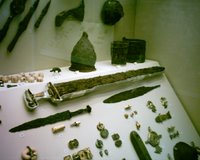
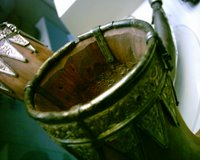
 I don't know that my words can do these objects justice. The Sutton Hoo ship-burial findings are especially nice. I think my favorite item is that little axe in the picture above-a wonderful specimen of a francisca, whence the name frankish and eventually french. The other really nifty item is this helmet that was made into a pot.
I don't know that my words can do these objects justice. The Sutton Hoo ship-burial findings are especially nice. I think my favorite item is that little axe in the picture above-a wonderful specimen of a francisca, whence the name frankish and eventually french. The other really nifty item is this helmet that was made into a pot.
After lunch... wait, I think I skipped lunch after that dreadful encounter with the BM gift shop...
I spent some time in the BM's research library for prehistoric Britain, they have wonderful libraries for each section of the museum. I was able to find a little bit more information about a torc I researched last year, and they gave me an e-mail address which will actually get me in contact with a real person.
The Wallace Collection is, alas, a camera-free zone. The website has some pictures of arms and armor, but photographs just can't do these things justice. Thankfully, the Wallace Collection has nothing in the way of A&A-related merchandise in their gift shop (other than a few plastic knights from Germany), or I would now be a penniless beggar playing a kazoo in the London underground stations.
The Globe was, of course, a must-see attraction. Sadly, there are no direct routes on the bus; you'll have to walk a few blocks no matter which way you get there. I had thought the bus I was on would take me directly to the Tate Modern, which is not far from the Globe, but the driver went nowhere near...
I got there eventually, and secured a £5 "standing" ticket. I then waited in line for an hour and a half.
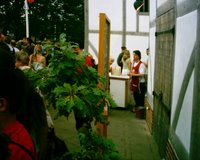
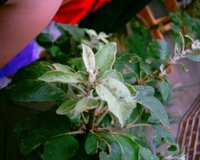 The Globe has aphids.
The Globe has aphids.After standing for a long time inside the foyer of the theatre and sitting on a picnic table near the actual door to the theatre (which is outside) for another forty minutes, I was finally inside Shakespeare's Globe. Waiting all that time was worth it, I got a pretty good spot up against the stage.

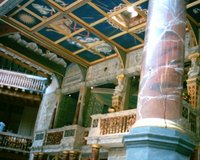
 We saw The Comedy of Errors, which is a perfectly hilarious story of twinsseparatedd at birth who get confused for each other. This production went out of its way toemphasizee the physical comedy of the story, and used classic Three Stooges/Marx Bros. gags (including orchestrated sound effects offstage) in every scene. Once I got over the initial shock, the whole thing was very effective. The one sound effect I wasn't sure about was the crashing cymbal for the sound of a smashed pot; I think I wrote a journal entry dealing with the subject on my ride back out of the city. I'll see if I can find it.
We saw The Comedy of Errors, which is a perfectly hilarious story of twinsseparatedd at birth who get confused for each other. This production went out of its way toemphasizee the physical comedy of the story, and used classic Three Stooges/Marx Bros. gags (including orchestrated sound effects offstage) in every scene. Once I got over the initial shock, the whole thing was very effective. The one sound effect I wasn't sure about was the crashing cymbal for the sound of a smashed pot; I think I wrote a journal entry dealing with the subject on my ride back out of the city. I'll see if I can find it.The show ended after 9:30, so it was 11:30 when I finally made it back to camp. Walking through the forest takes less time than you would think when it's dark...
Friday, July 21, 2006
London 20th/21st
I dropped my suitcase and computer bag off at the airport with the 'excess baggage co.' Then I took the tube to Loughton, on the other side of London.
Luckily it's faster if you don't take the road; it still took me 1.5hrs with the pack + daypack + trying to figure out where the place was. The Next morning the Campsite owner showed me a shortcut (You can see it on the map if you look just North of the campsite--"just go out the gate and walk straight.")
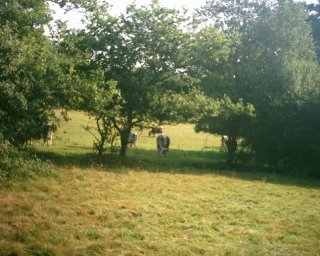
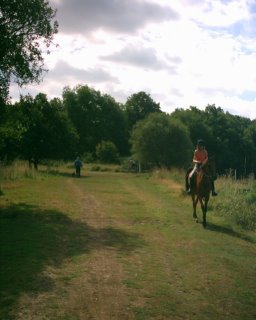
It's a beautiful area. Horse and cow pasture all around, with a nice, accessible forested area in the middle. Everyone was out walking their Greyhounds and Irish Setters and Arabs. (Errr... Arabian horses. I met one names Andre, didn't get the rider's name.)
Lots of Mercs and convertibles. One fellow who lives near the campsite drives a very nice 1960s Bentley, I didn't get a shot of it, unfortunately.
The campsite is what I would expect from any campsite, except that there's a police artillery training site nearby, so my sleep was interrupted by helecopter activity at 2 in the AM.
I guess that's better than bears...
Several hours of sticky commuter travel later (it's not the heat, it's the humanity!) I got to the station. Then I walked. 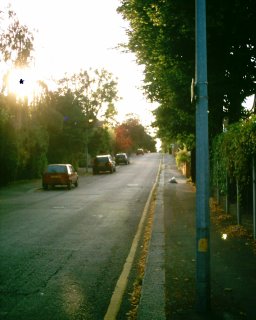 Not as steep as Headington Hill in Oxford, but not the way I had hoped to begin my vacation-time.
Not as steep as Headington Hill in Oxford, but not the way I had hoped to begin my vacation-time.
 Not as steep as Headington Hill in Oxford, but not the way I had hoped to begin my vacation-time.
Not as steep as Headington Hill in Oxford, but not the way I had hoped to begin my vacation-time.Luckily it's faster if you don't take the road; it still took me 1.5hrs with the pack + daypack + trying to figure out where the place was. The Next morning the Campsite owner showed me a shortcut (You can see it on the map if you look just North of the campsite--"just go out the gate and walk straight.")


It's a beautiful area. Horse and cow pasture all around, with a nice, accessible forested area in the middle. Everyone was out walking their Greyhounds and Irish Setters and Arabs. (Errr... Arabian horses. I met one names Andre, didn't get the rider's name.)
Lots of Mercs and convertibles. One fellow who lives near the campsite drives a very nice 1960s Bentley, I didn't get a shot of it, unfortunately.
The campsite is what I would expect from any campsite, except that there's a police artillery training site nearby, so my sleep was interrupted by helecopter activity at 2 in the AM.
I guess that's better than bears...
Last days/first days
Tuesday was fun. After everyone handed in their papers (before the 3 PM deadline) I went for a haircut, but they don't do shaves anymore, which made me sad because it meant going all the way back to the vines...
A bunch of us went out to the Eagle & Child for dinner, which was fun. I learned how to eat Prawns, which is gross in that seafood kind of way.
Tuesday evening we watched LOTR: Return of the King. One of the girls hadn't seen it yet, which convinced the others to skip FoTR and TTT. I haven't seen the theatrical cut of RotK in a while; it's amazing how much you miss those few key scenes. (It's also amazing how long the shortened version of the movie still manages to run... P.J. didn't really "cut his movie for length" so much as he "held himself back from adding more stuff." (cf. King Kong.)
Wednesday was the last day. Some went punting that hadn't yet, or did last-minute shopping, or saw the colleges they'd missed, or went to the Bod. One last time to get mad they couldn't find the book that they wanted or take anything out.
I saw Tolkien's Pinus Nigra at the botanical gardens.
One last meal, a banquet at Wycliffe Hall (of how I'd missed their lasagna... or not. Dessert was good, though.) Then we stood around for an hour while the girls took 10^9 pictures of all of us standing around in our banquet clothes. (Okay, it wasn't as bad as that; I'm happy I got some pictures with the friends I made in Oxford.)
Wednesday evening was time to pack. I discovered that somehow all of my notes and books and clothes were all over the floor and desk, and coffee mugs and plates and cutlery had mysteriously appeared. It's as if someone else had been living in my room for the last few days...
Thursday was sad. Everyone said goodbye. I stayed a while and had lunch with M.J. (one of the SCIO junior deans, actually a student from a year-long program who lucked out on the job of making sure we didn't kill ourselves studying/partying over the summer.) We had a weird/yummy pizza that had a salad on top of it. I went with her to take pictures of her piercing experience (she's 22, so young and rebellious) but the shop was closed; so I took a picture of the pink brick instead. M.J. says she'll e-mail me the poem she wrote for it, and I'll put up the photo eventually. There was a sorrowful goodbye, then I was off to London for the next phase of my trip...
M.J. says she'll e-mail me the poem she wrote for it, and I'll put up the photo eventually. There was a sorrowful goodbye, then I was off to London for the next phase of my trip...
A bunch of us went out to the Eagle & Child for dinner, which was fun. I learned how to eat Prawns, which is gross in that seafood kind of way.
Tuesday evening we watched LOTR: Return of the King. One of the girls hadn't seen it yet, which convinced the others to skip FoTR and TTT. I haven't seen the theatrical cut of RotK in a while; it's amazing how much you miss those few key scenes. (It's also amazing how long the shortened version of the movie still manages to run... P.J. didn't really "cut his movie for length" so much as he "held himself back from adding more stuff." (cf. King Kong.)
Wednesday was the last day. Some went punting that hadn't yet, or did last-minute shopping, or saw the colleges they'd missed, or went to the Bod. One last time to get mad they couldn't find the book that they wanted or take anything out.
I saw Tolkien's Pinus Nigra at the botanical gardens.
One last meal, a banquet at Wycliffe Hall (of how I'd missed their lasagna... or not. Dessert was good, though.) Then we stood around for an hour while the girls took 10^9 pictures of all of us standing around in our banquet clothes. (Okay, it wasn't as bad as that; I'm happy I got some pictures with the friends I made in Oxford.)

Wednesday evening was time to pack. I discovered that somehow all of my notes and books and clothes were all over the floor and desk, and coffee mugs and plates and cutlery had mysteriously appeared. It's as if someone else had been living in my room for the last few days...
Thursday was sad. Everyone said goodbye. I stayed a while and had lunch with M.J. (one of the SCIO junior deans, actually a student from a year-long program who lucked out on the job of making sure we didn't kill ourselves studying/partying over the summer.) We had a weird/yummy pizza that had a salad on top of it. I went with her to take pictures of her piercing experience (she's 22, so young and rebellious) but the shop was closed; so I took a picture of the pink brick instead.
 M.J. says she'll e-mail me the poem she wrote for it, and I'll put up the photo eventually. There was a sorrowful goodbye, then I was off to London for the next phase of my trip...
M.J. says she'll e-mail me the poem she wrote for it, and I'll put up the photo eventually. There was a sorrowful goodbye, then I was off to London for the next phase of my trip...
recap: last week
So, last Friday (the 14th...) I went to Salisbury. Stonehenge was okay, but they don't let you get close enough.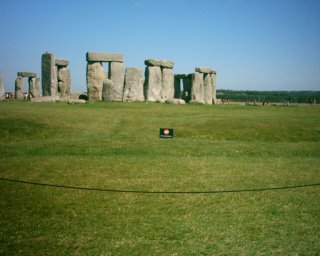 No Admittance.
No Admittance.
Salisbury cathedral was cool. Big, big stone buildings always are, I suppose. We climbed almost all the way to the top of the spire, we were above the bell room when it struck 2:00. Not as loud as I thought it would be, but some people thought it was painful. There are a lot of steps to get that high... I can't remember exactly how many. What's really key is that they're tiny little faerie-steps, so going down is actually harder than going up.
Saturday I went into London to meet Jim. (Hi Jim!)
We saw:
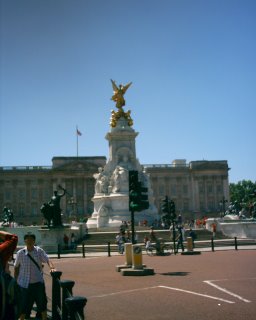 Buckingham Palace,
Buckingham Palace,
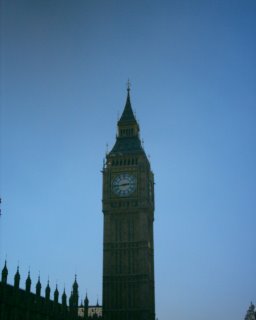
Big Ben,
as well as the Tate modern, the Globe (Anthony&Cleopatra was all sold out, sadly...) and then we went for evensong at St. Paul's. What a choir...
After the day was through (well, after Jim's jetlag set in and I started thinking about essays...) we went to the place he was staying and out for curry. Good food, good times. Jim's in Delhi now. (Jim, is your luggage there yet?)
Sunday, Monday, Tuesday I wrote for around 60 hours. Two essays, two book reviews, 8,000 words. Yikes. Some people started looking at me funny when they found out I was going to write all night, like I was crazy or something. Maybe I am crazy. Some of them were surprised that I actually finished everything; I don't know what that's about... It's like they've never seen me pull an all-nighter for last-minute essays before...)
I wish I could have done more research in Oxford. The library is great, though I didn't really get a chance to figure out the catalogue system at all. My professors all wanted lots of personal critical input, not so much research, so that's what I wrote.
 No Admittance.
No Admittance. Salisbury cathedral was cool. Big, big stone buildings always are, I suppose. We climbed almost all the way to the top of the spire, we were above the bell room when it struck 2:00. Not as loud as I thought it would be, but some people thought it was painful. There are a lot of steps to get that high... I can't remember exactly how many. What's really key is that they're tiny little faerie-steps, so going down is actually harder than going up.
We saw:
 Buckingham Palace,
Buckingham Palace,
Big Ben,
as well as the Tate modern, the Globe (Anthony&Cleopatra was all sold out, sadly...) and then we went for evensong at St. Paul's. What a choir...
After the day was through (well, after Jim's jetlag set in and I started thinking about essays...) we went to the place he was staying and out for curry. Good food, good times. Jim's in Delhi now. (Jim, is your luggage there yet?)
Sunday, Monday, Tuesday I wrote for around 60 hours. Two essays, two book reviews, 8,000 words. Yikes. Some people started looking at me funny when they found out I was going to write all night, like I was crazy or something. Maybe I am crazy. Some of them were surprised that I actually finished everything; I don't know what that's about... It's like they've never seen me pull an all-nighter for last-minute essays before...)
I wish I could have done more research in Oxford. The library is great, though I didn't really get a chance to figure out the catalogue system at all. My professors all wanted lots of personal critical input, not so much research, so that's what I wrote.
Wednesday, July 12, 2006
A cool little link
This story made me laugh. Monks and laser printers, what a combo.
http://www.wired.com/wired/archive/14.07/posts.html?pg=2
Those crazy Cistercians.
Maybe the rest of the church should look at their example a little bit closer... Is this a good way to be "in, but not of"?
http://www.wired.com/wired/archive/14.07/posts.html?pg=2
Those crazy Cistercians.
Maybe the rest of the church should look at their example a little bit closer... Is this a good way to be "in, but not of"?
Tuesday, July 11, 2006
Down to brass tacks
Tuesday's in the bag. All that's left are two seminars tomorrow, a field trip on Friday (Stonehenge!) and of course to finish my essays/book reports.
Not sure how I feel about Oxford. It's a busy little town right now with all of the tourists; the population has shifted while I've been here from students my own age to high schoolers and their parents wandering around the shops and landmarks looking for more things to take pictures of. I'll definitely have to come back during one of the terms next time I'm here.
My essays are slowly emerging from a stew of thoughts and ideas. The professors leading my seminars haven't been very specific at all about what they're looking for, which gives me a chance to show my ingenuity and so forth I suppose. We'll see what they think of my crazy Canadian ideas.
If anyone wants some music to listen to whilst trying to decode Lewis' poetry, the Peabody Concert Orchestra has recordings of Holst's Planets on their website. Holst was working with a slightly different cosmology than Lewis, so the Sun and moon are replaced by Uranus and Neptune, but Lewis was quite fond of the rest of Holst's interpretations. (Except Jupiter, which has one section based on a bit of a folk tune from the 19th C., which isn't nearly exalted enough for Lewis' perception of Jovial glory. Today, we recognize the style as something older than our contemporary music and immediately make the opposite reaction.)
You will, of course, recognize the most popular bits of Holst's themes from film soundtracks of the last thirty years or so. There is hardly a composer who hasn't drawn some inspiration from Holst at some point; this should not be seen as a problem as much as a blessing, because it captures exactly the kind of "thematic enjoyment" that Lewis was so adamant about. When you hear the Martial procession, you are meant to think of war and hardness and that's exactly what happens. The music communicates something that's very, very difficult to communicate in an intellectual way, though Lewis was trying (and succeeding, I think) to do it with words.
Not sure how I feel about Oxford. It's a busy little town right now with all of the tourists; the population has shifted while I've been here from students my own age to high schoolers and their parents wandering around the shops and landmarks looking for more things to take pictures of. I'll definitely have to come back during one of the terms next time I'm here.
My essays are slowly emerging from a stew of thoughts and ideas. The professors leading my seminars haven't been very specific at all about what they're looking for, which gives me a chance to show my ingenuity and so forth I suppose. We'll see what they think of my crazy Canadian ideas.
If anyone wants some music to listen to whilst trying to decode Lewis' poetry, the Peabody Concert Orchestra has recordings of Holst's Planets on their website. Holst was working with a slightly different cosmology than Lewis, so the Sun and moon are replaced by Uranus and Neptune, but Lewis was quite fond of the rest of Holst's interpretations. (Except Jupiter, which has one section based on a bit of a folk tune from the 19th C., which isn't nearly exalted enough for Lewis' perception of Jovial glory. Today, we recognize the style as something older than our contemporary music and immediately make the opposite reaction.)
You will, of course, recognize the most popular bits of Holst's themes from film soundtracks of the last thirty years or so. There is hardly a composer who hasn't drawn some inspiration from Holst at some point; this should not be seen as a problem as much as a blessing, because it captures exactly the kind of "thematic enjoyment" that Lewis was so adamant about. When you hear the Martial procession, you are meant to think of war and hardness and that's exactly what happens. The music communicates something that's very, very difficult to communicate in an intellectual way, though Lewis was trying (and succeeding, I think) to do it with words.
Monday, July 10, 2006
Little Game Part Two...
Alright, now that you're thinking about that first planet, let's try another.
Remember, these posts are taking the planets out of the order they take in the poem. The poem follows the pre-Copernican medieval cosmology for order: Moon, Mercury, Venus, Sol, Mars, Jove, and Saturn.
Let's do Mars now:
[following Sol]
But other country
Dark with discord dins beyond him,
With noise of nakers, neighing of horses,
Hammering of harness. A haughty god
MARS mercenary, makes there his camp
And flies his flag; flaunts laughingly
The graceless beauty, grey-eyed and keen,
--Blond insolence--of his blithe visage
Which is hard and happy. He hews the act,
The indifferent deed with dint of his mallet
And his chisel of choice; achievement comes not
Unhelped by him; --hired gladiator
Of evil and good. All's one to Mars,
The wrong righted, rescued meekness,
Or trouble in trenches, with trees splintered
And birds banished, banks fill'd with gold
And the liar made lord. Like handiwork
He offers to all--earns his wages
And whistles the while. White-feathered dread
Mars has mastered. His metal's iron
That was hammered through hands into holy cross,
Cruel carpentry. He is cold and strong,
Necessity's song.
Lewis was also apparently interested in the mythological figure of Mars Silvanus, a deity associated with the woods and trees. Not exactly a popular version of the Mars figure, but important for its explanation of an otherwise troubling problem with one of Lewis' books.
From That Hideous Strength, we get a passage about the common bond of war, the positive aspects not of conflict itself, but the spirit of courage that keeps us together and inspires us to fight for each other.
Lewis doesn't say much in The Discarded Image, except that "[Mars] gives men martial temperament, 'sturdy hardiness'... But he is a bad planet, Infortuna Minor. He causes wars.
This one might seem easier to get than the first, perhaps, because we still understand the implications of the Martial spirit so much better than Jove's influence. However, the Jove poem is much easier to figure out if you're just looking at little details in the words used to convey the spirit of the planet.
Remember, these posts are taking the planets out of the order they take in the poem. The poem follows the pre-Copernican medieval cosmology for order: Moon, Mercury, Venus, Sol, Mars, Jove, and Saturn.
Let's do Mars now:
[following Sol]
But other country
Dark with discord dins beyond him,
With noise of nakers, neighing of horses,
Hammering of harness. A haughty god
MARS mercenary, makes there his camp
And flies his flag; flaunts laughingly
The graceless beauty, grey-eyed and keen,
--Blond insolence--of his blithe visage
Which is hard and happy. He hews the act,
The indifferent deed with dint of his mallet
And his chisel of choice; achievement comes not
Unhelped by him; --hired gladiator
Of evil and good. All's one to Mars,
The wrong righted, rescued meekness,
Or trouble in trenches, with trees splintered
And birds banished, banks fill'd with gold
And the liar made lord. Like handiwork
He offers to all--earns his wages
And whistles the while. White-feathered dread
Mars has mastered. His metal's iron
That was hammered through hands into holy cross,
Cruel carpentry. He is cold and strong,
Necessity's song.
Lewis was also apparently interested in the mythological figure of Mars Silvanus, a deity associated with the woods and trees. Not exactly a popular version of the Mars figure, but important for its explanation of an otherwise troubling problem with one of Lewis' books.
From That Hideous Strength, we get a passage about the common bond of war, the positive aspects not of conflict itself, but the spirit of courage that keeps us together and inspires us to fight for each other.
Lewis doesn't say much in The Discarded Image, except that "[Mars] gives men martial temperament, 'sturdy hardiness'... But he is a bad planet, Infortuna Minor. He causes wars.
This one might seem easier to get than the first, perhaps, because we still understand the implications of the Martial spirit so much better than Jove's influence. However, the Jove poem is much easier to figure out if you're just looking at little details in the words used to convey the spirit of the planet.
Friday, July 07, 2006
A little game...
[07/10 edited for clarity, added some hints]
Alright, if any of you are still reading my boring and infrequently-updated blog, here's some fun to be had...
As I've said, I'm taking a seminar here with a former Oxford Scholar who is writing a book that will revolutionize critical approaches to some of C. S. Lewis' best writing. If you can't handle the suspense, you can probably find the Times Lit. Supplement article that has an early explanation of the new theory. If you can wait a while, I'll try to make things interesting for you...
First, the ground rules:
If you've got the answer, don't just post it in the comments section. Either translate your guess into ROT13 here, or give me an e-mail to see if you're right.
This "key" to C.S. Lewis' fiction is based on a close reading of some of his writing on a specific topic: every post will have an excerpt from Planets, a poem Lewis published in 1935. Other significantly relevant passages are in Ch. 15 of That Hideous Strength, the last book is Lewis' "Cosmic Trilogy." Another relevant reading will be in Lewis' book on Medieval literature and thought, called The Discarded Image. If you're really desperate you can look that up, but you should be able to come up with something based on the poem by itself.
The application of the "key" is very important: if you want a refresher on Lewis' approach to storytelling, there's an essay called "Meditation in a Toolshed" that's currently printed in the God in the Dock collection. I'll say this much: the important thing about this whole "secret key" to his writing is that it was focused on infusing his writing with an atmosphere that you will be completely absorbed in, to the point that you'd never notice the thing because you're too busy enjoying it.
Now, for the poem excerpt. I'm playing with the ordering of things to make this a bit easier for you all.
...as we mount further
Where rippled radiance rolls about us
Moved with music--measureless the waves'
Joy and jubilee. It is JOVE's orbit,
Filled and festal, faster turning
With arc ampler. From the Isles of Tin
Tyrian traders, in trouble steering
Came with his cargoes; the Cornish treasure
That his ray ripens. Of wrath ended
And woes mended, of winter passed
And guilt forgiven, and goof fortune
Jove is master; and of jocund revel,
Laughter of ladies. The lion-hearted,
The myriad-minded, men like the gods,
Helps and heroes, helms of nations
Just and gentle, are Jove's children,
Work his wonders. On his white forehead
Calm and kingly, no care darkens
Nor wrath wrinkles: but righteous power
And leisure and largess their loose splendours
Have wrapped around him--a rich mantle
Of ease and empire. ...
In That Hideous Strength, specifically note the part where Glund Oyarsa, or Jove (Jupiter) comes into the house.
In The Discarded Image, Lewis makes the following notes about Jupiter:
Jupiter, the King... The character he produces in men would now be very imperfectly expressed by the word 'jovial', and is not very easy to grasp; it is no longer, like the saturnine character, one of our archetypes. We may say it is Kingly; but we must think of a King at peace, enthroned, taking his leisure, serene. The Jovial character is cheerful, festive yet temperate, tranquil, magnanimous.
[A big hint: Who would you say is a cultural icon in our world for the 'jovial' spirit? This character has more recently been denounced as a symbol of materialism and hollywood silliness, but Lewis would probably defend the origins of the myth...]
Let me know what you think!
Alright, if any of you are still reading my boring and infrequently-updated blog, here's some fun to be had...
As I've said, I'm taking a seminar here with a former Oxford Scholar who is writing a book that will revolutionize critical approaches to some of C. S. Lewis' best writing. If you can't handle the suspense, you can probably find the Times Lit. Supplement article that has an early explanation of the new theory. If you can wait a while, I'll try to make things interesting for you...
First, the ground rules:
If you've got the answer, don't just post it in the comments section. Either translate your guess into ROT13 here, or give me an e-mail to see if you're right.
This "key" to C.S. Lewis' fiction is based on a close reading of some of his writing on a specific topic: every post will have an excerpt from Planets, a poem Lewis published in 1935. Other significantly relevant passages are in Ch. 15 of That Hideous Strength, the last book is Lewis' "Cosmic Trilogy." Another relevant reading will be in Lewis' book on Medieval literature and thought, called The Discarded Image. If you're really desperate you can look that up, but you should be able to come up with something based on the poem by itself.
The application of the "key" is very important: if you want a refresher on Lewis' approach to storytelling, there's an essay called "Meditation in a Toolshed" that's currently printed in the God in the Dock collection. I'll say this much: the important thing about this whole "secret key" to his writing is that it was focused on infusing his writing with an atmosphere that you will be completely absorbed in, to the point that you'd never notice the thing because you're too busy enjoying it.
Now, for the poem excerpt. I'm playing with the ordering of things to make this a bit easier for you all.
...as we mount further
Where rippled radiance rolls about us
Moved with music--measureless the waves'
Joy and jubilee. It is JOVE's orbit,
Filled and festal, faster turning
With arc ampler. From the Isles of Tin
Tyrian traders, in trouble steering
Came with his cargoes; the Cornish treasure
That his ray ripens. Of wrath ended
And woes mended, of winter passed
And guilt forgiven, and goof fortune
Jove is master; and of jocund revel,
Laughter of ladies. The lion-hearted,
The myriad-minded, men like the gods,
Helps and heroes, helms of nations
Just and gentle, are Jove's children,
Work his wonders. On his white forehead
Calm and kingly, no care darkens
Nor wrath wrinkles: but righteous power
And leisure and largess their loose splendours
Have wrapped around him--a rich mantle
Of ease and empire. ...
In That Hideous Strength, specifically note the part where Glund Oyarsa, or Jove (Jupiter) comes into the house.
In The Discarded Image, Lewis makes the following notes about Jupiter:
Jupiter, the King... The character he produces in men would now be very imperfectly expressed by the word 'jovial', and is not very easy to grasp; it is no longer, like the saturnine character, one of our archetypes. We may say it is Kingly; but we must think of a King at peace, enthroned, taking his leisure, serene. The Jovial character is cheerful, festive yet temperate, tranquil, magnanimous.
[A big hint: Who would you say is a cultural icon in our world for the 'jovial' spirit? This character has more recently been denounced as a symbol of materialism and hollywood silliness, but Lewis would probably defend the origins of the myth...]
Let me know what you think!
Monday, July 03, 2006
Heat Wave
It's hot over here in England. ~30° on the weekend, highs dropping to 24 later this week.
It's also quite humid here. Nobody has air-conditioning except the shops, which all close at around 5:30PM.
All this would have been fine, I suppose, except that I came more prepared for cold & wet weather. Mostly I brought the same stuff I wear at home, so it's not as bad as it could have been. I can't understand how so many of the lecturers can wear jackets while talking for an hour... I would shrivel and die in a puff of steam!
Classes are getting into full swing now; the seminar format of this programme (while not as extreme as the tutorial format used in a normal Oxford programme) is quite interesting: all grading is based on the professor's assessment of written work and presentations made to the class. This means that the lectures we're attending are strictly informational, and in many cases superfluous. Strangely, this fact makes the lectures somewhat more compelling and useful; I feel encouraged to take what I need and do what I like with the information, applying it to my area of expertise.
Tomorrow evening is the 4th of July "open mic night" for our group; I'll try to come up with something suitably Canadian. (I've already had a few requests for our anthem...)
It's also quite humid here. Nobody has air-conditioning except the shops, which all close at around 5:30PM.
All this would have been fine, I suppose, except that I came more prepared for cold & wet weather. Mostly I brought the same stuff I wear at home, so it's not as bad as it could have been. I can't understand how so many of the lecturers can wear jackets while talking for an hour... I would shrivel and die in a puff of steam!
Classes are getting into full swing now; the seminar format of this programme (while not as extreme as the tutorial format used in a normal Oxford programme) is quite interesting: all grading is based on the professor's assessment of written work and presentations made to the class. This means that the lectures we're attending are strictly informational, and in many cases superfluous. Strangely, this fact makes the lectures somewhat more compelling and useful; I feel encouraged to take what I need and do what I like with the information, applying it to my area of expertise.
Tomorrow evening is the 4th of July "open mic night" for our group; I'll try to come up with something suitably Canadian. (I've already had a few requests for our anthem...)
Saturday, July 01, 2006
The pictures you've been waiting for...
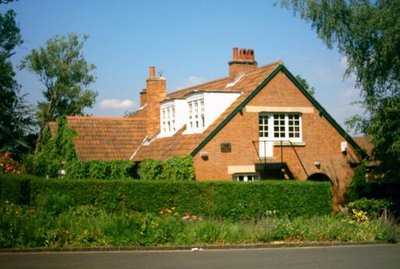
This is where Lewis lived the later half of his life. It's called The Kilns because in the 19th C. the land was used for pottery-making, and up until the 1960s the big kilns were still standing.
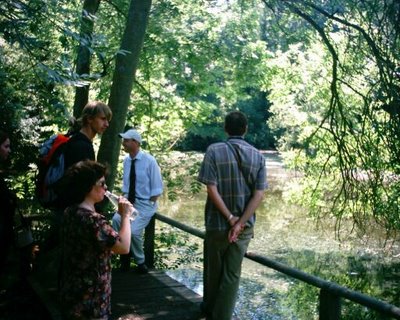 Here's the pond just a short walk from The Kilns; the pond is where they would have dug for clay when the place was still used for pottery. The water is murky and weedy now, but Lewis&co used to swim in it and skate on it when it froze.
Here's the pond just a short walk from The Kilns; the pond is where they would have dug for clay when the place was still used for pottery. The water is murky and weedy now, but Lewis&co used to swim in it and skate on it when it froze.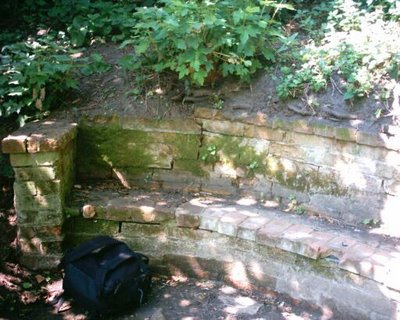 This is a stone bench beside the pond. A good place to sit and reflect.
This is a stone bench beside the pond. A good place to sit and reflect.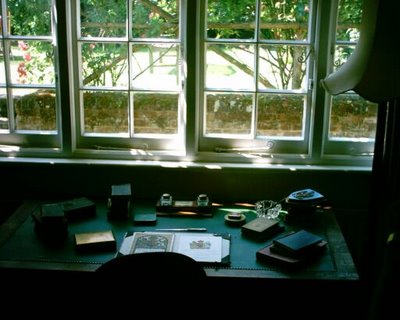 This is a desk in the sitting room inside the house. Nothing is original, sadly. The best place to see Lewis artifacts in at Wheaton College in the states, they bought up a big load of stuff when it was sold off.
This is a desk in the sitting room inside the house. Nothing is original, sadly. The best place to see Lewis artifacts in at Wheaton College in the states, they bought up a big load of stuff when it was sold off.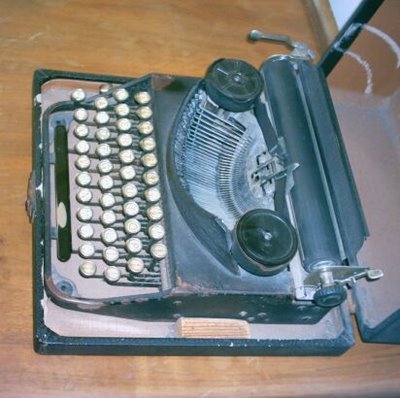 This is one of the very few artifacts remaining in the house: the typewriter. No, I didn't have any paper to try it out with.
This is one of the very few artifacts remaining in the house: the typewriter. No, I didn't have any paper to try it out with.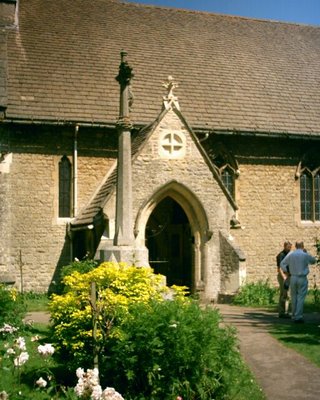 This is the Headington Quarry parish Church where Lewis was a member. It's a fairly average Anglican church on the inside.
This is the Headington Quarry parish Church where Lewis was a member. It's a fairly average Anglican church on the inside.Some sightseeing pictures
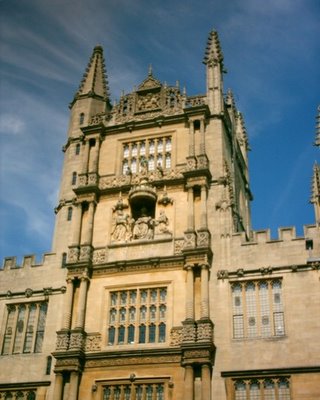 This is one of the spires of the Bodleian Library. The columns each represent a different era of classical architechtural design.
This is one of the spires of the Bodleian Library. The columns each represent a different era of classical architechtural design. This is our friend the "Jesus Duck," who we see on our walk from the vines to Wycliffe Hall through University Park. I'm not sure how well you can see it in the photo, but he's standing on top of the water. Yesterday he was standing on the railing of the bridge, giving us a sermon.
This is our friend the "Jesus Duck," who we see on our walk from the vines to Wycliffe Hall through University Park. I'm not sure how well you can see it in the photo, but he's standing on top of the water. Yesterday he was standing on the railing of the bridge, giving us a sermon.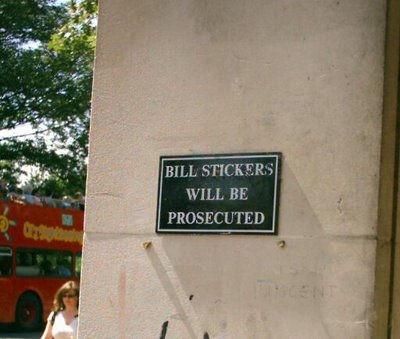 Who is this William Stickers guy, and what do the English have against him?
Who is this William Stickers guy, and what do the English have against him?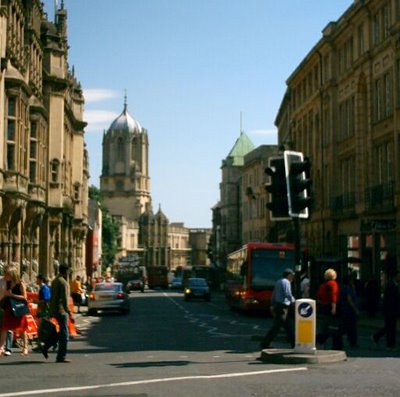 The view down St. Aldate's street from the corner of High Street. That's Tom Tower, park of Christchurch College.
The view down St. Aldate's street from the corner of High Street. That's Tom Tower, park of Christchurch College.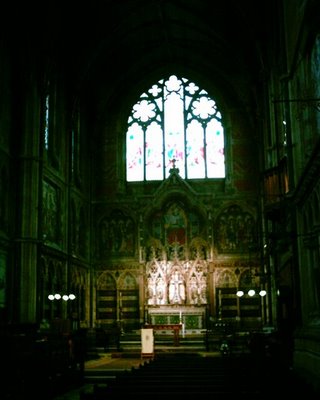 This is from inside the chapel at Keble College, which is almost just across the street from Wycliffe Hall.
This is from inside the chapel at Keble College, which is almost just across the street from Wycliffe Hall.


